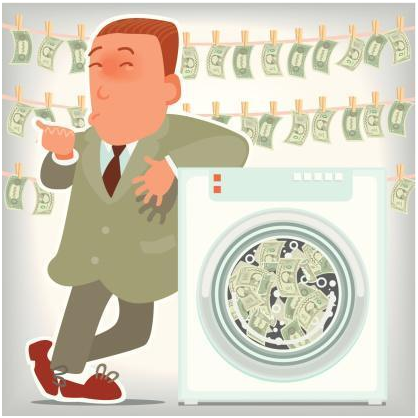
Money laundering is pretty self-explanatory. It’s the process of cleaning dirty – illegal – money by running it through a business.
While most people’s money worries come from not having enough of it, there is a minority of people that struggle with having too much of it. After, if you deposit £100,000 into your current account, it’s going to raise a few eyebrows.
So, instead of depositing the cash in the bank, money launders makes it look like it has come from a different, and legal, source. This rids it of its links to criminal acts and turns it into spendable cash.

In the worst case scenario, if the money isn’t laundered it can be connected to the crimes and seized by officials. In the best, you’ll have millions of pounds and nowhere to spend it.
Sometimes the business involved in the laundering is just as at fault as the person trying to hide the cash, but due to advances in technology, these days criminals can even target the most legitimate and unsuspecting businesses.
In most cases, money laundering is associated with drug trafficking, fraud, racketeering, insider trading, tax evasion, and the list goes on. However, sometimes people will try and launder legal money for other purposes, such as hiding wealth in divorce settlements.
How is money laundered?
There are many different methods for laundering money, such as structured deposits, shell companies, and gambling, but the one that affects you, is when criminals choose to invest in or buy from legitimate businesses.
Let’s say you’re a jeweller; you might have a very loyal client that is often spending thousands of pounds on extravagant jewellery for their wife. You might think it a little odd or over-the-top, but would you have considered the possibility that their actually laundering their dirty cash?
Business loan company Everline blogged on the subject, remarking that genuine and legitimate businesses can often be drawn into money laundering schemes without even realising it (!), and they aren’t wrong…
How to prevent money laundering
Whether you are the CEO of a multi-million pound international company, or a one-man band, it is still your responsibility to prevent money laundering.
The first step you should take is to be aware of particularly large transaction or clients that regularly spend significant amounts of money. If a customer or client ever asks your business to execute a transaction in a bizarre manner, alarm bells should start ringing.
The same goes is a wealthy individual randomly seeks investment into your business. Rather than having a genuine passion for your industry, they’re more likely searching for a way to launder their cash.
The next step is to work with companies that provide money laundering protection, who also offer a plethora of other useful business services, as well as looking at other tools that could prevent your involvement in criminal activity.
Who is at risk?
The businesses that are the most attractive to money launderers are those that don’t require a lot of paperwork, such as pubs, restaurants, taxis, casinos, and strip clubs. However, any business that doesn’t take financial crime seriously is weak enough to be targeted.
In 2013, there was a thematic review into how the UK banks were managing the risk of money laundering. While there were largely effective controls in place, some of the weaknesses included lack of policies and procedures, lack of management information, inconsistent risk assessments, and lack of training.
Money Laundering Regulations
UK businesses that fall into the following sectors: money service businesses, high value deals, trust or company service providers, and accountancy service providers, are covered by Money Laundering Regulations.
While this offers protection, it does mean that the business must have a supervisory authority. If you belong to a professional body, such as the Law Society or Financial Conduct Authority, you’ll already be supervised. If not, you’ll need to register with HMRC.
You’ll need to complete form MLR100 and apply for the ‘fit and proper test’ by completing form MLR101. The forms should be sent to HRMC along with the fee and any additional information. You can find more details about how to apply on the HMRC website.
Money laundering is becoming an increasing problem as technology develops, making it easier for criminals to hide cash. Make sure that your business is protected from this illegal activity by putting the necessary safeguards in place.
AUTHOR BIO: James McFadden is a UK property developer with more than 100 properties in his portfolio. In his spare time, he provides business tips and advice on his blog.







